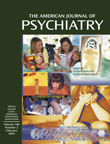Fatigue in Obstructive Sleep Apnea: Driven by Depressive Symptoms Instead of Apnea Severity?
Abstract
OBJECTIVE: Obstructive sleep apnea is a common and frequently devastating illness that often includes significant fatigue. Fatigue is also a hallmark depressive symptom. The authors wondered if depressive symptoms in patients with obstructive sleep apnea would account for some of the fatigue beyond that explained by obstructive sleep apnea severity. METHOD: Sixty patients with obstructive sleep apnea—i.e., score ≥15 on the respiratory disturbance index (mean score=49; range=15–111)—underwent polysomnography and completed the Center for Epidemiological Studies Depression Scale (CES-D Scale), Profile of Mood States (POMS), and Medical Outcomes Study surveys. Data were analyzed by using hierarchical regression, with POMS fatigue score as the dependent variable (step 1, forced entry of apnea severity variables; step 2, forced entry of CES-D Scale score). RESULTS: Whereas score on the respiratory disturbance index and the percent of time oxygen saturation was <90% together accounted for 4.2% of variance in scores on the POMS fatigue scale, the CES-D Scale score accounted for 10 times the variance (i.e., an additional 42.3%) in POMS fatigue scale score. CONCLUSIONS: After obstructive sleep apnea severity was controlled, higher levels of depressive symptoms were dramatically and independently associated with greater levels of fatigue. Assessment and treatment of mood symptoms—not just treatment of the disordered breathing itself—might reduce the fatigue experienced by patients with obstructive sleep apnea.



